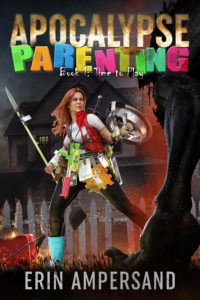
As I’ve mentioned a few times, I’m back leading a team for the third incarnation of the Self-Published Science Fiction Competition (SPSFC3), and when I saw a litRPG book in our batch featuring a suburban Mom trying to keep her three kids alive during an alien invasion, I was torn between my stereotypes of litRPG and my desire to see more parenthood in fiction. I decided to subject my stereotypes to an actual example, and requested Apocalypse Parenting: Time to Play by Erin Ampersand as part of my scouting allotment. And I’m glad I did!
Apocalypse Parenting follows an Alabama mother of three, at home with her kids while waiting for her husband to return from a business trip when suddenly all electronics power down and a voice from the heavens informs her that Earth has been entered into an intergalactic reality show that will last until humanity controls 30% of the planet’s land area or 95% of them are dead. Good luck! And so the lead and her children—ages 3, 6, and 9–are cast against their will into a deadly game, with malevolent creatures spawning throughout their neighborhood and a selection of special abilities helping give them a fighting chance.
Apocalypse Parenting was an entirely new reading experience for me, and largely a positive one. I’d never read litRPG before, so I can’t compare this book to the rest of the subgenre—and I can’t say which of its good and bad features just come with the subgenre and which are particular to the book—but it’s certainly one that has encouraged me to look beyond my stereotypes.
One of its biggest strengths was just how realistic the characters felt. Lots of fiction purports to feature regular people in unusual situations, but the characters in Apocalypse Parenting really do feel like regular people thrown into a bizarre, game-like environment. There are very few characters able to take advantage of prodigious talent in niche fields; instead, there’s whole lot of “okay, there’s a bunch of random stuff in my house, what will actually be useful as a weapon or as a shield?” And reading as a parent of three myself (slightly younger than the lead’s three), the interactions with the kids felt just about perfect; in particular, the inability of the lead to fully explain why the children should call their fortified wagon a “tagon” instead of a “wank” was hilarious.
The pacing is that of a serial as opposed to a traditional novel, which I personally saw as a mixed blessing. On the positive side, there was a steady stream of new obstacles to overcome, and if any slow stretches arose, I could be confident they wouldn’t last more than a chapter or two. On the other hand, seeing so much focus on the day-to-day challenges threw into stark relief just how much gets skipped in a more traditional plot structure. Grinding low-level monsters offered plenty of challenge in the early stages, but those early stages linger quite a bit more than I would’ve expected in more mainstream fiction.
There is a major end-of-book climax, which I also found a mixed blessing. It was intense, and it pushed the characters in new and interesting ways without leaving them on a true cliffhanger. In short, it’s just the kind of ending that makes you want to pick up the second book without making you feel that the first book just stopped in the middle of a climactic scene. On the other hand, because the finale felt like such a game-changer, it highlighted just how much of the potential character development was being postponed for the sequel. For serial readers, no big deal. But for someone judging the book as a novel and not as a series, it’s harder to watch the book end with so much left to do.
But even if the sequel promises a level up in character development and difficulty of opponent, Apocalypse Parenting was much more than grinding out rat kills. I found the most compelling episodes to be those featuring the lead trying her best to get others in the neighborhood to work together toward survival. There was plenty of selfishness and mutual distrust to fight in the beginning, but it became clear over time that the game highly incentivized competition—after all, it’s an alien reality show, and where’s the fun in everyone getting along?—and the obstacles to fostering cooperation grew higher and higher. As before, these conflicts truly had the flavor of regular people trying to work through their problems, and the interpersonal issues added another layer of conflict that resonated beyond just figuring out how to survive the next monster.
Overall, I had a lot of fun with Apocalypse Parenting, and I’ll be recommending it to the rest of my teammates to evaluate for the semifinals, and I’m pretty sure I won’t be the only one doing so. I did find that the serial pacing led to a few slow spots, and I would’ve liked to see some of the character-related sequel promises developed further in the opening book, but it was a really entertaining read that has caused me to reevaluate litRPG as a subgenre. If you enjoy watching ordinary people trying to find ways to survive extraordinary situations, Apocalypse Parenting demands a read.
Recommended if you like: litRPG, serials, ordinary people solving alien problems, parenthood in fiction.
Can I use it for Bingo? It’s Self-Published, and it counts for Mundane Jobs if and only if you count unpaid labor (in this case, stay-at-home parent) as a “job.”
Overall rating: 15 of Tar Vol’s 20. Four stars on Goodreads.
SPSFC score: 7.5/10 for my personal score. The official team score, as well as whether it not it progresses to the quarterfinals or semifinals, will be decided in concert with my teammates.
